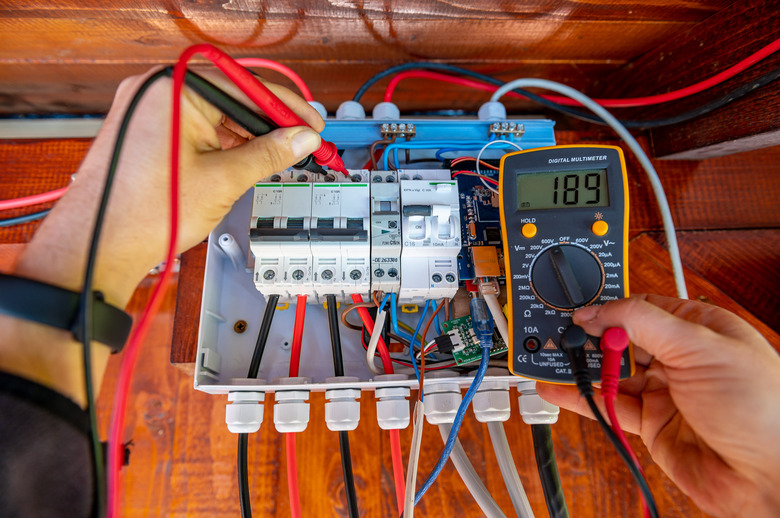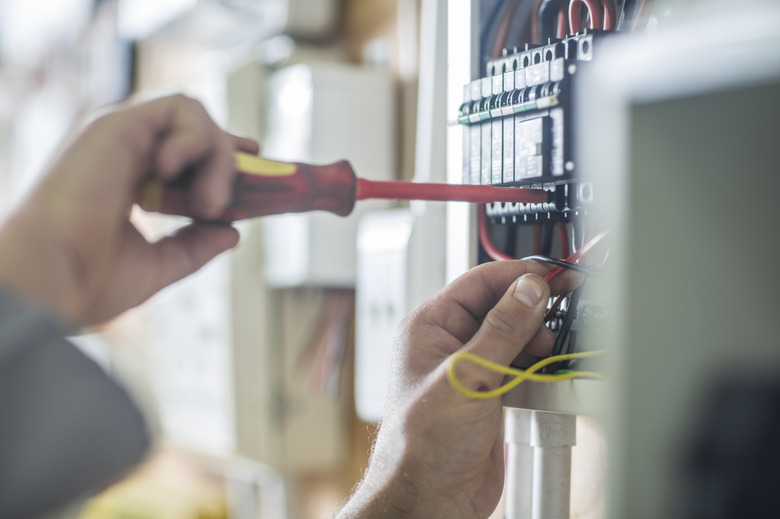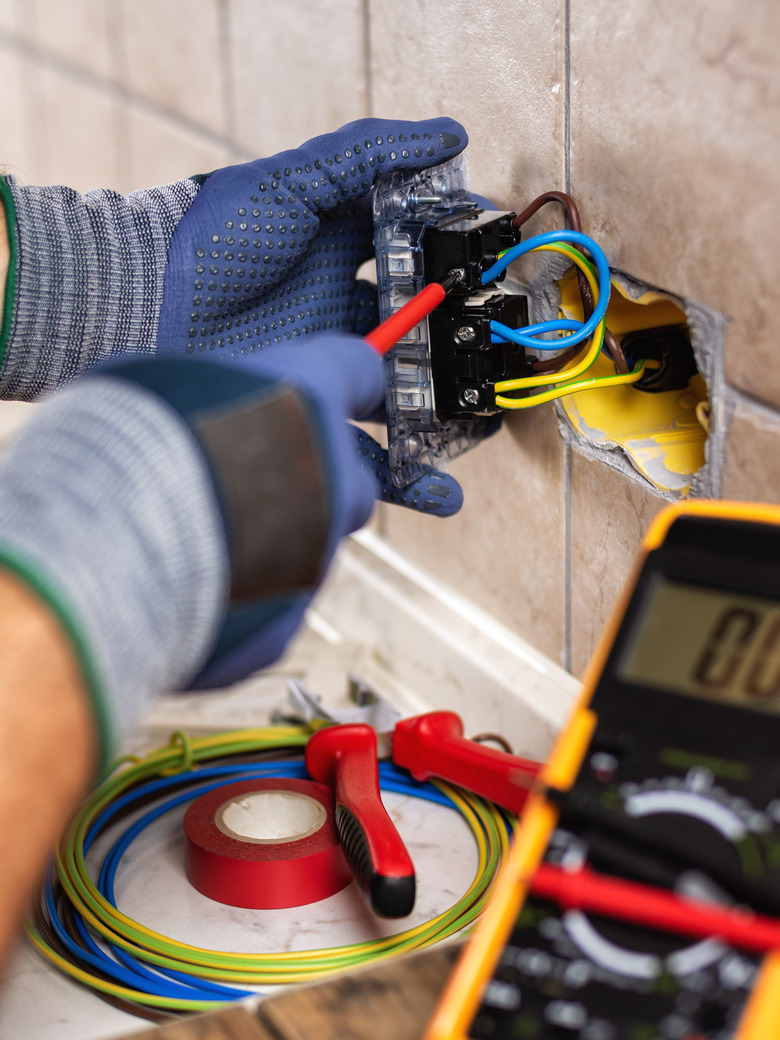How To Hire An Electrician
We may receive a commission on purchases made from links.
You don't need an electrician for every electrical problem that happens in your home if you have enough experience to do electrical repairs yourself, but most people don't, and they shouldn't try to do any but the most simple repairs. If lights aren't working, for example, anyone can replace the bulbs, but if there's a problem with light fixtures themselves, only someone who understands electricity should try to repair them. But even homeowners with electrical smarts should confine their activities to replacing receptacles, switches, and light fixtures and leave extensive wiring to a pro.
Looking for a pro to help you wire a bathroom, or simply need help installing a new outlet? Here's what you can expect when you hire an electrician.
What an Electrician Does
What an Electrician Does
Electrical contractors work in all areas of residential and commercial construction, and the one you would call to fix electrical systems in your house usually specializes in residential maintenance (as opposed to being a commercial electrician). If you're doing a remodel, on the other hand, it's best to call a contractor who focuses on that. Residential contractors are licensed to perform all aspects of home wiring, including:
- Detecting and repairing circuit faults, such as short circuits caused by incorrect or outdated wiring, open neutrals (which can cause lights to flicker or dim) circuit overloads, open or nonexistent ground connections (which can cause shocks and damage electrical equipment) and disconnects, or broken wires that cause a loss of power.
- Planning and installing new electrical wiring for remodels and rewiring existing circuits or adding on to them.
- Servicing malfunctioning electrical equipment, including switches, receptacles, and light fixtures.
- Troubleshooting the connections to large electrical appliances, which are typically hardwired into an electrical circuit.
- Servicing the electrical panel, including installing or replacing circuit breakers or upgrading the panel as needed to accommodate upgraded wiring.
- Connecting a standby generator to the electrical system.
Some electrical problems aren't in the wheelhouse of a residential electrical contractor. For example, if a tree knocks down the power line to your house during a storm, the power company will send out its own team of specialized electricians, called linesmen, to fix it. Similarly, if a hardwired electrical appliance isn't working because of an internal problem, a licensed appliance repair pro would normally repair that, not an electrician.
Because electrical wires are hidden behind walls, installing new wiring and repairing existing wiring often calls for holes in the walls or outright demolition that needs repair when the electrical work is finished. Electricians don't normally do these repairs. If you can't do them yourself, you need to hire a building contractor or handyperson for that.
Do Your Homework Before Calling an Electrician
Do Your Homework Before Calling an Electrician
In most cases, you'll want to minimize the time the electrician spends at your house because every extra hour can cost you as much as $100. Besides that, most service calls include a surcharge for transportation, which means you can usually save money by letting minor problems accumulate so an electrician can handle them all at once instead of making repeated trips.
Repairs will proceed more smoothly and will cost you less if you can describe the problems you want corrected in detail and make access as easy as possible. For example, if you're having trouble with a particular receptacle, clear away all furniture that might be in the way so the electrician doesn't have to waste time and your money doing it. If you don't know where your electrical panel is, find it before the electrician arrives so valuable time and money aren't wasted searching for it while the electrician is on the clock.
When hiring electricians for remodels, you can save time and money by having plans drawn and ready before the electrical work starts. The plans should include the layout of the space and the positions of cabinets and other fixtures so the electrician knows where to place receptacles, switches, and lights and how many of each are required to satisfy code. Keep in mind that major electrical repairs may involve a loss of power for an extended period, so plan for that by having a place to go while the work is being done.
Why Hire an Electrician?
Why Hire an Electrician?
In theory, you should have a licensed electrician do virtually all home improvement electrical projects, including installing light fixtures and electrical receptacles. In practice, however, many states and communities allow homeowners to do minor electrical work in their own house as long as they can prove they are the property owner. Electricians can at times be scarce, and they are expensive, so many homeowners do simple electrical jobs themselves or hire them out to a pro who doesn't have a license to do electrical work, such as a handyperson or a general contractor.
Some jobs, however, are too complicated or dangerous for this DIY approach and should always be completed by an electrical contractor. These include:
- Any work that requires a permit, including remodels and new construction. Part of the service the electrical contractor provides is securing the permit and guaranteeing that the work will pass inspection. Such work includes rough-in wiring, upgrading the electrical panel, and installing a whole-house generator.
- Work inside the service panel itself, including installing or replacing a circuit breaker. A competent homeowner may be able to change a breaker, but considering the fact that the panel is always receiving power that can deliver a fatal shock, it's prudent to leave panel work to licensed pros.
- Rewiring or installing new wiring. Even if you don't need a permit, you still need a code-fluent electrician who can ensure the job is done safely and correctly. This avoids having electrical issues flagged by a home inspector if you ever decide to sell the house, and it could save you from expensive repairs.
- Installation of a hardwired appliance, such as an electric stove, or a ceiling fan. Unlike light fixtures, ceiling fans have complex wiring, especially when controlled by multiple switches.
Questions to Ask an Electrical Contractor Before Hiring
Questions to Ask an Electrical Contractor Before Hiring
Electricians may be more scarce than other types of contractors, and the ones that are available are usually busy, but you still have a choice. Before hiring, you should ask these questions to be sure you're working with the right person.
Are You Licensed and Insured?
You want proof of a license to ensure the contractor is qualified, and you want proof of liability insurance to protect yourself in case something goes wrong. Improper wiring can cause fires and personal injury, and you don't want to be on the hook financially for accidents that aren't your fault.
Do You Have References?
Get a list of references and call them. Over and above the issue of quality of workmanship, references will alert you to work history and habits. You might find out that the contractor is habitually behind schedule or has a history of overcharging. It's also a good idea to check an electrician's record with the Better Business Bureau before hiring.
What's Your Hourly Rate/How Much Will the Job Cost?
It's good to get this information up front to avoid being surprised by a bill that is much larger than you thought it would be. When multiple people will be working at the same time, be sure you're clear on the overall rate you're paying.
The best electrician is hardly ever the cheapest. If a contractor's rate is much lower than others, that could signify problems, such as being insufficiently equipped to do the job or a propensity to take more time than necessary to complete it.
Who Will Do the Work?
The contractor who comes to do the initial quote may be a master electrician with years of experience, but that's not necessarily the person who will do the job. Most contractors have a crew of journeymen and apprentices who do the actual work, and while it's still the contractor's license on the line, you want to make sure the person doing the job is competent.
Can You Finish the Work on Time?
Electrical contractors are often overbooked. Choose one who can make a commitment to work within your timeline.
The Cost of Hiring an Electrician
The Cost of Hiring an Electrician
The going rate for electrical contractors is between $50 and $100 per hour, but there are other costs to figure into the total bill.
- Travel: Expect to pay a surcharge for the time it takes for the electrician to get to your house. Add to that the time it takes to travel to the store to get supplies. A top-notch electrician is well-supplied and should come to the job with everything needed to complete it, but a less costly one may have to make multiple trips, quickly erasing the advantage of the lower hourly rate.
- Materials: Don't forget to factor in the cost of wire, devices, and miscellaneous items needed to complete the job.
- Job complexity: An hourly rate makes more sense for simple projects, such as replacing a light fixture, than for complex, time-consuming ones, like upgrading electrical panels or completely rewiring electrical systems. Some contractors will offer flat rates for complex jobs, such as upgrading a panel.
- Emergency service: If you need something in a hurry, expect to pay one and a half to two times the electrician's normal rate.
Electrician Licensing and Certification
Electrician Licensing and Certification
Anyone who wants to work professionally as an electrician needs a license. All but eight states require electricians to be licensed at the state level. In those that do not have a state requirement — Illinois, Indiana, Kansas, Louisiana, Mississippi, Missouri, New York, and Pennsylvania — licensure is usually required at the city or county level.
There are three certification levels for electricians:
References
Electrician Apprentice
An electrician apprentice must have a high school diploma. Apprentices typically receive about four years (8,000 hours) of on-the-job training. In addition, most jurisdictions require apprentices to attend several hundred hours of classes to learn electrical theory. After meeting these requirements, an apprentice has to pass an exam before becoming a journeyman electrician, which is the next level.
Journeyman
A journeyman license permits an electrician to operate independently. The requirements for moving to the next certification level vary from state to state. In some states, you must work for two years (4,000 hours) as a residential or commercial electrician and pass an exam. In others, you simply need to have your journeyman's license for a prescribed period, which can vary from one year to four years, before taking the exam. In still other states, passing an exam overseen by the state or a local licensing authority is the sole requirement.
Master Electrician
A master electrician is fully qualified to operate as an electrical contractor and can receive a state contractor's license in states that require one. In other states, master electricians are eligible for licensing or certification issued by the city or county in which they operate. A master electrician is empowered to employ both apprentice and journeyman electricians and, as you might expect, charges the top hourly rate.


